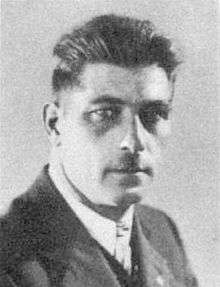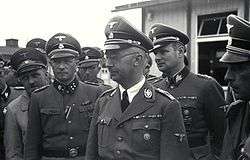Franz Kutschera

Franz Kutschera (22 February 1904 – 1 February 1944) was an Austrian Nazi politician (gardener by trade), SS-Brigadeführer and war criminal. During the World War II, as SS and Police Leader in occupied by Nazi Germany Warsaw, the capital of Poland, he was sentenced to death by the Polish Home Army resistance movement in agreement with the Polish government in exile and executed in front of the SS headquarters in a special action by a combat sabotage unit (predecessor of Battalion Parasol) of Kedyw mainly manned by members of scouting and guiding Gray Ranks.
Life
Kutschera was born in Oberwaltersdorf, Lower Austria, the son of a gardener. After elementary school he served as a ship boy in the Austro-Hungarian Navy in 1918–19 and subsequently trained as a gardener. In the 1920s, he temporarily lived in Troppau (Opava) and Karlsbad (Karlovy Vary) in Czechoslovakia.
Nazi career

Kutschera joined the Nazi Party in December 1930 and the SS in November 1931. From 1933 he acted as a SS-Truppführer in Carinthia and from July 1935 was leader of the 90th SS-Standarte based in Klagenfurt, which received the name Franz Kutschera after his death. He was arrested several times after the Austrian Nazi Party was banned by the Austrofascist government.
Upon the Austrian Anschluss to Nazi Germany in 1938, Kutschera retired from active service in the SS, holding the rank of Obersturmbannführer, and for a short time (February to May 1938) acted as a returning officer in the administration of the newly established Reichsgau Kärnten. On May 24 he was appointed deputy of the Carinthian Gauleiter Hubert Klausner, and finally became acting Gauleiter himself upon Klausner's sudden death on 12 February 1939. After the 1938 election and referendum, Kutschera also became a member of the Großdeutscher Reichstag parliamentary assembly, maintaining this position until his death. Early in 1939 he was appointed lay judge at the People's Court.
In World War II Kutschera achieved the rank of a SS-Brigadeführer in 1940 and upon the German Balkan Campaign in 1941 served in the occupied CdZ areas of Carinthia and Carniola, where he distinguished himself in the fight against Yugoslav Partisans with fanaticism and extreme harshness. After the beginning of Operation Barbarossa, he was seconded to the High SS and police leader (HSSPF) staff of Central Russia (Mogilev) under SS-Obergruppenführer Erich von dem Bach in late January 1942, directing Holocaust and mass murder operations in the occupied territories of the Soviet Union. Late in 1942 he became major general of the police and on 20 April 1943 was appointed SS and Police Leader in the Mogilev district.
Execution

On 25 September 1943, Kutschera assumed office as SS and Police leader in the Warsaw district of the General Government in occupied Poland. He was sentenced to death by a secret Special Court of the Polish Underground State for the crimes against the Polish nation, in particular mass murders of civilians. The death sentence was approved by the Polish government in exile and the execution order was given by the commander of the Kedyw organization, Brigadier General Emil August Fieldorf (“Nil”).
The execution in a special action, code-named "Operation Kutschera", part of the larger "Operation Heads", was carried out in front of the Warsaw SS headquarters at Leszczyński Palace on Ujazdów Avenue in a special action by a combat sabotage unit (predecessor of Battalion Parasol) of Kedyw mainly manned by members of scouting and guiding Gray Ranks.[1] In the morning of 1 February 1944, Kutschera was shot in his limousine as he approached the gate. An intensive firefight ensued, and four scouts lost their lives.
The German authorities had 100 civilian hostages shot in revenge the next day and imposed a 100 million złoty tribute on Polish residents of Warsaw and Warsaw County. Kutschera was succeeded as Warsaw SS and Police leader by Paul Otto Geibel in March 1944.
References
- Dunin-Wąsowicz, Marek (1957) "Zamach na Kutscherę", Warszawa
- Mazower, Mark (2008) Hitler's Empire, Penguin Press, ISBN 978-1-59420-188-2
- Stachniewicz, Piotr (1982) "AKCJA "KUTSCHERA", Książka i Wiedza, Warszawa
Notes
- ↑ Mazower, Mark (2008) Hitler's Empire, pp 495
| Wikimedia Commons has media related to Franz Kutschera. |